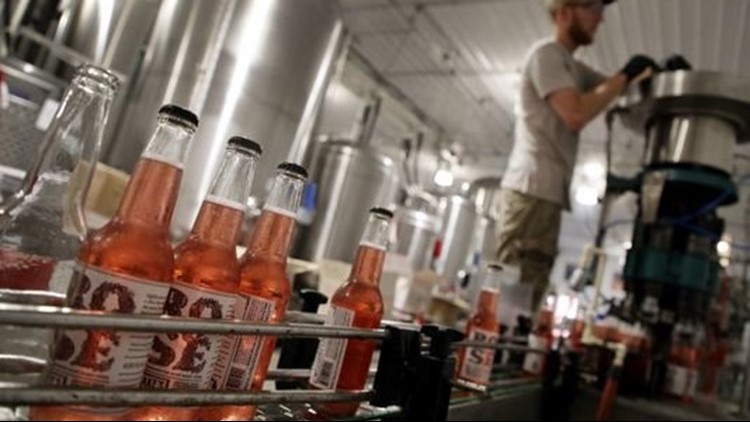ARMADA — Leafy branches shook as Jose Luis Zepeda moved both hands in rapid precision Wednesday, picking ripe, greenish-red apples and dropping them into a large basket that hung from his shoulders.
In a big, red, barn-like structure nearby, a crew bottled and canned Rosé (6.9% alcohol by volume), a hard apple cider made with strawberries and rose hips at Blake's Hard Cider Co. in Armada, in northern Macomb County. From picking to packaging, the entire alcoholic-cider-making process occurs on a 72-year-old family farm that started making the adult beverage five years ago. Since then, it's rapidly become popular.
In 2017, Blake's Hard Cider produced a little less than 15,000 barrels (there are 31 gallons in a beer -- or in this case, hard cider -- barrel). If it were a brewery, that volume would put it among Michigan's 10 largest.
And in fact, Blake's is getting into brewing: This week, Windfall Brewing Co. was revealed as the name for the small brewing operations recently added to Blake's Orchard. Alongside about 16 hard ciders, nine beers are offered at the on-site taproom — for now, the only place the beers are available.
Jose Luis Zepeda picks apple at Blake's Orchard in Armada on Wednesday, September 5, 2018. (Photo: Romain Blanquart, Detroit Free Press)
Harvest — the busy season at Blake's — just started, and many people have added a Blake's taproom visit to their tradition of visiting the farm for non-alcoholic cider and doughnuts. Most of the farm's estimated 700,000 visitors this year will arrive between now and Christmas, said Blake's marketing manager Chelsea Iadipaolo.
Outside its taproom, Blake's is frequently found near craft beer on shelves and taps. As with with craft beer, there are creative flavor profiles in several of its hard ciders: El Chavo (6.5 percent ABV) is made with habanero and mango. The Tonic (6.5 percent ABV) has cucumber and ginger. Rainbow Seeker (5.5 percent ABV) has pineapple and sage.
And not just Michiganders are drinking it: Blake's Hard Cider is available in 18 states from the Midwest to the Atlantic Coast.
"There (are) national brands that don't taste as good as ours," said co-owner Paul Blake, 59. "They use artificial sweeteners. They use juice concentrate. We use real apples, real cider, 100% natural. There's a difference in the taste, there's a difference in the quality."
The more-than 800 acre farm is independently owned by the family and produces a range of vegetables and fruits such as cherries, strawberries and raspberries, some of which make it into the hard ciders.
Cider growing fast
As Blake's Hard Cider has grown, the Blake family has beefed up its staff with multiple former employees of Atwater Brewery in Detroit, among other breweries. Last year, its $2 million expansion included adding enough fermenters to potentially crank out 80,000 barrels per year, according to staff.
"We've been at a growth clip of about 40 percent a year," Blake said. "That's our goal for the next three years, to try to continue to grow 40 percent a year."

Paul Blake, one of the owners of Blake's Orchard looks at a batch of freshly picked apples in Armada on Wednesday, September 5, 2018. (Photo: Romain Blanquart, Detroit Free Press)
This year, the cider-making at Blake's is expected to total about 24,000 barrels. That appears to make it the biggest cider maker in Michigan.
Starcut Ciders, which is part of Bellaire-based Short's Brewing Co., this year will make about 3,500 to 4,000 barrels, said Short's co-owner Scott Newman-Bale. Tha's a much smaller number than the anticipated 50,000 barrels of Short's beer to be produced in 2018.
"Cider is a fascinating subject and one that I think is going to get more and more attention over the next several years," he said.
In fact, Newman-Bale said he's been drinking more hard cider than beer for about the past year-and-a-half.
"It's a little less — I find I get a little less bloated from it. A little easier to drink," he said.
But he said they've found it tougher to get people to notice the hard ciders.
"The clientele is very different to craft beer. We don't have brand loyalty per se," Newman-Bale said. "If you're lucky, most places have one cider on tap."
But nonetheless, he said he thinks Blake's growth is sustainable, as others such as Austin Eastciders in Texas have managed to develop a substantial following.
'A phenomenal crop'
Unlike with a brewery, where malts are nearly always sourced from someplace else, the apple supply at a cider-maker such as Blake's is "subject to a bad crop season," said Blake's Hard Cider brew master Matt Wiles, who oversees cider-making operations.
Michigan is the third-largest apple producer in the United States, harvesting about 840 million pounds in 2017, according to the Michigan Apple Committee.
"This year, it's a phenomenal crop," Blake said. "I've been full-time here since 1981, and I don't think we've ever had a better crop than we had this year."
He said they didn't have any late freezes that affected the apple trees' blossoms.
"We had plenty of rain this summer. We had lots of sunshine," Blake said. "The only thing we're looking for now is some cool nights. And when you get cool nights, the apple turns really red. So we have everything in the books now other than the cool nights and we're going to have a phenomenal crop."
A post shared by Robert Allen (@radetroit) on
Wiles worked at Atwater, Saugatuck Brewing Co. in Douglas, Tri-City Brewing Co. in Bay City, Honolulu Beerworks in Hawaii and Petoskey Brewing Co. in Petoskey before he came to Blake's. He said the operations on a family farm bring some unique challenges and variables.
"I learned how to drive a tractor in my first month here," said Wiles, who started at Blake's about five months ago.
The "biggest hurdle" is purifying the well water and rebuilding the chemistry so it's conducive to cider-making, he said.

Brewmaster Matt Wiles takes a sample of Rose hard cider at Blake's Orchard in Armada on Wednesday, September 5, 2018. (Photo: Romain Blanquart, Detroit Free Press)
More than 400 people work at Blake's Orchards last year, but more than half of them were part-time. Much of that involves the farming; the brewing and cider-making operations employ about 12.
"With every growing business, there's a lot of pain and a lot of excitement," Blake said. "In the past, we were kind of a seasonal business. So one of the assets is we're able to hire young professionals that are full-time and give them careers here to grow. And that's pretty exciting."
Combine that with the ingredients grown on-site, and Blake is optimistic.
"We truly are a gourmet product," he said. "And we're pretty proud of that. I think that's going to carry us pretty far in this business."

Blake's Hard Cider facilities at Blake's Orchard in Armada on Wednesday, September 5, 2018. (Photo: Romain Blanquart, Detroit Free Press)
Spirits of Detroit columnist Robert Allen covers craft alcohol for the Free Press. Contact him: rallen@freepress.com or on Untappd, raDetroit and Twitter, @rallenMI.



